Scottish Premiership
 | |
| Country | Scotland |
|---|---|
| Confederation | UEFA |
| Founded | 2013 |
| Number of teams | 12 |
| Level on pyramid | 1 |
| Relegation to | Scottish Championship |
| Domestic cup(s) | Scottish Cup |
| League cup(s) | Scottish League Cup |
| International cup(s) |
UEFA Champions League UEFA Europa League |
| Current champions |
Celtic (3rd title)[note 1] (2015–16) |
| Most championships |
Celtic (3 titles)[note 1] |
| TV partners |
Sky Sports BT Sport BBC Scotland |
| Website |
www |
|
| |
The Scottish Premiership, known for sponsorship reasons as the Ladbrokes Premiership,[1] is the top division of the Scottish Professional Football League, the league competition for men's professional football clubs in Scotland. The Scottish Premiership was established in July 2013, after the Scottish Professional Football League was formed by a merger of the Scottish Premier League and Scottish Football League.[2]
Competition format
Teams receive three points for a win and one point for a draw. No points are awarded for a loss. Teams are ranked by total points, then goal difference, and then goals scored. At the end of each season, the club with the most points is crowned league champion. If points are equal, the goal difference determines the winner. If this still does not result in a winner, the tied teams must take part in a playoff game at a neutral venue to determine the final placings.[3]
Split
The top flight of Scottish football has contained 12 clubs since the 2000–01 season, the longest period without change in the history of the Scottish football league system.[4] During this period the SPL and now the SPFL have operated a "split" format. This is done to prevent the need for a 44-game schedule, based on playing each other four times. That format was used in the Scottish Premier Division, but is now considered to be too high a number of games in a league season.
A season, which runs from August until May, is divided into two phases. During the first phase, each club plays three games against every other team, either once at home and twice away or vice versa. After this first phase of matches, by which time all clubs have played 33 games, the league splits into a 'top six' and a 'bottom six'. Each club then plays a further five matches, one against each of the other five teams in their own section. Points achieved during the first phase of 33 matches are carried forward to the second phase, but the teams compete only within their own sections during the second phase. After the first phase is completed, clubs cannot move out of their own section in the league, even if they achieve more or fewer points than a higher or lower ranked team, respectively.
At the beginning of each season, the SPFL 'predicts' the likely positions of each club in order to produce a fixture schedule that ensures the best possible chance of all clubs playing each other twice at home and twice away. This is known as the league seeding and is based on clubs' performance in previous years.[5] If a club does not finish in the half where it is predicted to finish, it faces the possibility of playing an unequal number of home and away games. For example, one club sometimes plays another three times at home and once away.[5]
Promotion and relegation
The bottom placed Premiership club at the end of the season is relegated, and swaps places with the winner of the Scottish Championship, provided that the winner satisfies Premiership entry criteria. With the creation of the SPFL, promotion and relegation play-offs involving the top flight were introduced for the first time in 17 years.[4][6] That now means the Premiership club in 11th place face the Championship play-off winners over two legs.[7] The winner of those play-offs will earn the right to play in the Scottish Premiership the following season along with the winners of the Scottish Championship. The Scottish Football League had used playoffs between its three divisions since 2007.[8]
European qualification
Clubs finishing in the top positions of the Premiership will gain qualification to compete in one of UEFA's European competitions. UEFA grants European places to the Scottish Football Association, determined by the Scotland's position in the UEFA coefficients ranking system. The Scottish Football Association in turn allocate a number of these European places to final Scottish Premiership positions.
Currently, the top placed team in the Scottish Premiership gains qualification to the UEFA Champions League qualifying round 2, whilst the second and third placed teams gain qualification to the UEFA Europa League at qualifying round 2 and qualifying round 1, respectively.[9]
Clubs
The clubs listed below have competed in the Scottish Premiership since it was formed in 2013.
| Club | Position in 2015–16 | First season in top division |
First season of current spell in top division |
Last title |
|---|---|---|---|---|
| Aberdeen | 2nd, Scottish Premiership | 1905–06 | 1905–06 | 1984–85 |
| Celtic | 1st, Scottish Premiership (champions) | 1890–91 | 1890–91 | 2015–16 |
| Dundee | 8th, Scottish Premiership | 1893–94 | 2014–15 | 1961–62 |
| Dundee United | 12th, Scottish Premiership (relegated) | 1925–26 | — | 1982–83 |
| Hamilton Academical | 10th, Scottish Premiership | 1906–07 | 2014–15 | — |
| Heart of Midlothian | 3rd, Scottish Premiership | 1890–91 | 2015–16 | 1959–60 |
| Hibernian | 3rd, Scottish Championship | 1895–96 | — | 1951–52 |
| Inverness Caledonian Thistle | 7th, Scottish Premiership | 2004–05 | 2010–11 | — |
| Kilmarnock | 11th, Scottish Premiership | 1899–1900 | 1992–93 | 1964–65 |
| Motherwell | 5th, Scottish Premiership | 1903–04 | 1985–86 | 1931–32 |
| Partick Thistle | 9th, Scottish Premiership | 1897–98 | 2013–14 | — |
| Rangers | 1st, Scottish Championship (promoted) | 1890–91 | 2016–17 | 2010–11 |
| Ross County | 6th, Scottish Premiership | 2012–13 | 2012–13 | — |
| St Johnstone | 4th, Scottish Premiership | 1924–25 | 2009–10 | — |
| St Mirren | 6th, Scottish Championship | 1890–91 | — | — |
Stadiums
| Aberdeen | Celtic | Dundee | Hamilton Academical | Heart of Midlothian | Inverness Caledonian Thistle |
|---|---|---|---|---|---|
| Pittodrie Stadium | Celtic Park | Dens Park | New Douglas Park | Tynecastle Stadium | Caledonian Stadium |
| Capacity: 20,866[10] | Capacity: 60,411[11] | Capacity: 11,506[12] | Capacity: 5,510[13] | Capacity: 17,480[14] | Capacity: 7,750[15] |
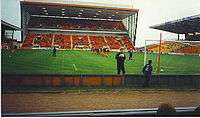 |
 |
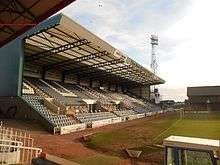 |
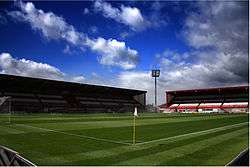 |
 |
 |
| Kilmarnock | Motherwell | Partick Thistle | Rangers | Ross County | St Johnstone |
|---|---|---|---|---|---|
| Rugby Park | Fir Park | Firhill Stadium | Ibrox Stadium | Victoria Park | McDiarmid Park |
| Capacity: 17,889[16] | Capacity: 13,677[17] | Capacity: 10,102[18] | Capacity: 50,817[19] | Capacity: 6,541[20] | Capacity: 10,696[21] |
 |
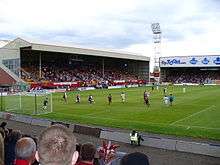 |
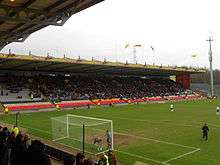 |
 |
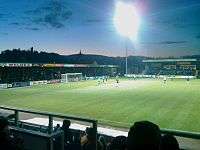 |
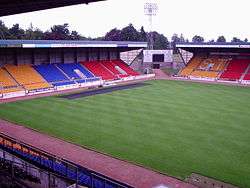 |
Statistics
Championships
| Season | Winner | Runner-up | Third | Top scorer | Players' Player of the Year | Writers' Player of the Year |
|---|---|---|---|---|---|---|
| 2013–14 | Celtic | Motherwell | Aberdeen | Kris Commons 27 (Celtic) | Kris Commons (Celtic) | Kris Commons (Celtic) |
| 2014–15 | Celtic | Aberdeen | Inverness CT | Adam Rooney 18 (Aberdeen) | Stefan Johansen (Celtic) | Craig Gordon (Celtic) |
| 2015–16 | Celtic | Aberdeen | Heart of Midlothian | Leigh Griffiths 31 (Celtic) | Leigh Griffiths (Celtic) | Leigh Griffiths (Celtic) |
As of 2016, Scotland's top-flight league championship has been won 54 times by Rangers and 47 times by Celtic. Nine other clubs have won the remaining 19 championships, with three clubs tied for third place with 4 apiece. The last time the championship was won by a club other than Rangers or Celtic was 1984–85, by Aberdeen.
Records and awards
- Biggest home win
- Celtic 8–1 Hamilton Academical, 19 January 2016[22]
- Biggest away win
- Motherwell 0–5 Celtic, 6 December 2013;[23] Ross County 0–5 Celtic, 18 October 2014[24]
- Most points in a season
- 99; Celtic, 2013–14
- Fewest points in a season
- 23; Hearts, 2013–14 (15 points deducted due to entering Administration.)
- Fastest goal
- Kenny McLean, for St Mirren against Hibernian, 13 seconds, 19 April 2014[25]
- Highest transfer fee paid
- Jozo Šimunović, from Dinamo Zagreb to Celtic, £5.5 million, 1 September 2015[26][27]
- Highest transfer fee received
- Virgil van Dijk, from Celtic to Southampton, £13 million, 1 September 2015[28]
- Youngest player
- Jack Aitchison, for Celtic v Motherwell, 16 years and 71 days[29]
- Youngest goalscorer
- Jack Aitchison, for Celtic v Motherwell, 16 years and 71 days[29]
Top goalscorers
Celtic striker Leigh Griffiths has scored the most goals in the Scottish Premiership, with 54 goals since 2013.
- As of 25 October 2016
| Rank | Player | Club(s)[note 2] | Goals |
|---|---|---|---|
| 1 | Leigh Griffiths[note 3] | Celtic (2014–) | 54 |
| 2 | Adam Rooney[note 3] | Aberdeen (2014–) | 48 |
| 3 | Kris Commons[note 3] | Celtic (2011–) | 41 |
| 4 | Billy Mckay[note 3] | Inverness CT (2011–2015) Dundee United (2015–2016) | 40 |
| 5 | John Sutton[note 3] | Motherwell (2013–2015) St Johnstone (2015–2016) | 35 |
Broadcasting rights
Notes
- 1 2 The Scottish Premiership has only existed since 2013. For a complete record of clubs that have won Scottish league championships, see list of Scottish football champions.
- ↑ Clubs only include those where players scored goals in the Scottish Premiership.
- 1 2 3 4 5 Player also scored goals in the Scottish Premier League.
References
- ↑ "SPFL names Ladbrokes as sponsor in £4m deal". BBC News. 13 May 2015. Retrieved 13 May 2015.
- ↑ "SPFL: New Scottish league brands unveiled". BBC Sport. BBC. 24 July 2013. Retrieved 24 July 2013.
- ↑ "The Rules and Regulations of the Scottish Professional Football League" (PDF). Scottish Professional Football League. 1 December 2015. pp. 36–7. Retrieved 3 February 2016.
- 1 2 Anderson, Craig (24 July 2013). "The Scottish Premiership 2013/14 in numbers". The Scotsman. Johnston Publishing. Retrieved 11 December 2013.
- 1 2 Grant, Michael (8 August 1999). "SPL stand by their split decision". Sunday Herald. Herald & Times Group. Retrieved 11 December 2013.
- ↑ McLaughlin, Chris (28 June 2013). "The new Scottish Professional Football League survives hitch". BBC Sport. BBC. Retrieved 11 December 2013.
- ↑ McGuiness, Nathan. "The Scottish Professional Football League". Retrieved 6 April 2014.
- ↑ Campbell, Andy (30 April 2013). "Scottish Premier League considers play-off introduction". BBC Sport. BBC. Retrieved 11 December 2013.
- ↑ "SPFL European qualification".
- ↑ "Aberdeen Football Club". Scottish Professional Football League. Retrieved 11 November 2013.
- ↑ "Celtic Football Club". Scottish Professional Football League. Retrieved 11 November 2013.
- ↑ "Dundee Football Club". Scottish Professional Football League. Retrieved 11 November 2013.
- ↑ "Hamilton Academical Football Club". Scottish Professional Football League. Retrieved 11 November 2013.
- ↑ "Heart of Midlothian Football Club". Scottish Professional Football League. Retrieved 11 November 2013.
- ↑ "Inverness Caledonian Thistle Football Club". Scottish Professional Football League. Retrieved 11 November 2013.
- ↑ "Kilmarnock Football Club". Scottish Professional Football League. Retrieved 11 November 2013.
- ↑ "Motherwell Football Club". Scottish Professional Football League. Retrieved 11 November 2013.
- ↑ "Partick Thistle Football Club". Scottish Professional Football League. Retrieved 11 November 2013.
- ↑ "Rangers Football Club". Scottish Professional Football League. Retrieved 11 November 2013.
- ↑ "Ross County Football Club". Scottish Professional Football League. Retrieved 11 November 2013.
- ↑ "St Johnstone Football Club". Scottish Professional Football League. Retrieved 11 November 2013.
- ↑ "Celtic 8–1 Hamilton". BBC Sport. BBC. 19 January 2016. Retrieved 20 January 2016.
- ↑ "Motherwell 0–5 Celtic". BBC Sport. BBC. 6 December 2013. Retrieved 4 July 2015.
- ↑ "Scottish Premiership: Celtic thrash Ross County 5–0". Sky Sports. BSkyB. 18 October 2014. Retrieved 4 July 2015.
- ↑ "St Mirren 2–0 Hibernian". BBC Sport. BBC. 19 April 2014. Retrieved 4 July 2015.
- ↑ Jackson, Keith; Swan, Craig (31 August 2015). "Celtic make second £4m move for Dinamo Zagreb stopper Jozo Simunovic as Virgil van Dijk finally gets set to seal £11m move to Southampton". Daily Record. Retrieved 18 April 2016.
- ↑ "Celtic agree fee for Dinamo Zagreb defender Jozo Simunovic". Sky Sports. 31 August 2015. Retrieved 18 April 2016.
- ↑ "Virgil van Dijk: Southampton sign Celtic defender for £13m". BBC Sport. BBC. 1 September 2015. Retrieved 3 September 2015.
- 1 2 English, Tom (15 May 2016). "Celtic 7–0 Motherwell". BBC Sport. BBC. Retrieved 16 May 2016.